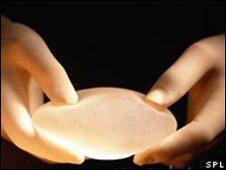Breast implants 'need checking'
- Published

Breast augmentation is the most popular cosmetic procedure
Women with breast enlargements are being advised to contact their surgeon amid concerns about the safety of a certain type of implant.
A French inquiry has found that Poly Implant Prostheses - or PIPs - are filled with an unapproved gel and are missing protective barriers.
About 50,000 British women may have these implants.
The body for plastic surgeons warned against alarm, but said those with PIPs needed a check-up within six months.
If an ultrasound establishes that the implant is weakened or ruptured, then both should be removed, the British Association of Aesthetic Plastic Surgeons (BAAPS) advised.
"This is certainly an unusual situation but so far there is no serious cause for alarm - whilst further tests are conducted into the substance, we recommend that women who've undergone breast augmentation contact their surgeons to find out what type of implant was used," said its president Nigel Mercer
"If it's PIP they should have an ultrasound in the next six months to establish whether there is any weakening or rupture. At present removal is recommended in these cases, but if there is one ruptured implant, the contralateral one should be taken out as well, as a preventative measure."
Mattress claim
In March, The Medicines and Healthcare products Regulatory Agency (MHRA) said no more PIPs should be implanted and that any remaining should be returned to the manufacturer.
The French company which produced PIPs has gone into administration. All the devices were recalled in France earlier this year.
The inquiry by the French association of plastic surgeons reported that the company had from 2005 dispensed with the protective barrier and was also using a gel with a composition different from that approved.
To determine how the altered version might react with the human body, BAAPs says French colleagues contacted the gel manufacturers for any studies. There were none, as they had understood the substance to be intended for use in mattresses.
Nigel Mercer added that surgeons who had fitted PIPs should not be held accountable for doing so.
"There was no way of knowing the gel was untested or that the protective envelope, which adds strength and restricts the gel from travelling into the body, had been dispensed with."
PIPs were among the cheaper brands of breast implants available. The French started investigating after surgeons reported they were rupturing more quickly than other brands.